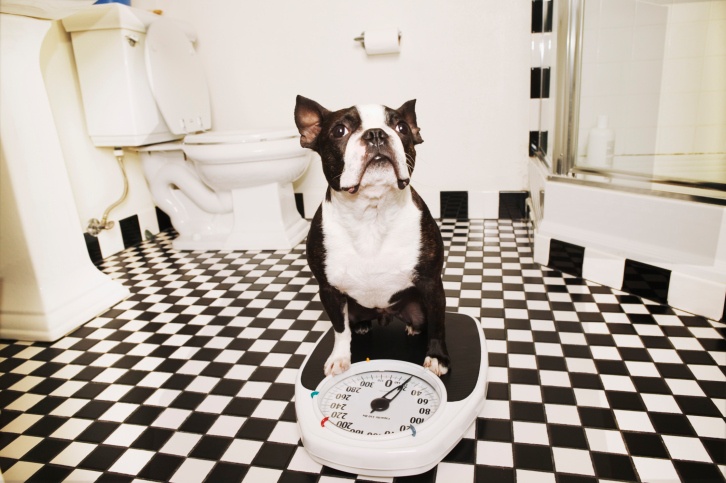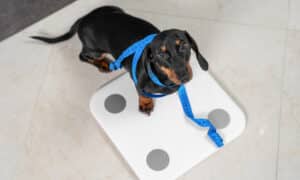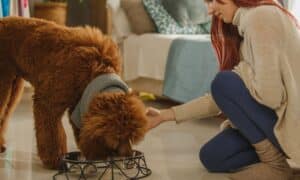“This post contains affiliate links, and I will be compensated if you make a purchase after clicking on my links.”

Dear Steve,
I have 4 dogs, 2 are labs. They have gotten fat. How do I make them lose weight?
– Cyndra
The issue of overweight dogs is on the rise, and there are many factors contributing to this alarming trend. Poor food choices and a sedentary lifestyle are the two main components. An overweight dog is more susceptible to diabetes, liver problems, joint issues, and an overall lower quality of life.
Unlike with humans, dogs are incapable of preparing their own food and controlling their physical exercise. So the responsibility of creating a healthy weight for our four-legged friend is on us.
Prior to starting my career as a full-time professional dog trainer, I worked as a Certified Strength and Conditioning Specialist, Physical Education teacher and coach. Many of the same principles we use in helping humans get in better shape, apply to our canine companions.
The first element we need to look at is the dog’s current state of health. Take your pet to the vet for a thorough medical exam and comprehensive blood work panel. This will rule out: any underlying health condition that could contribute to weight gain, ensures that your dog is in proper physical health before starting an exercise/diet routine, and confirm that no current medication may be inducing weight gain.
Weight loss is simple, but not necessarily easy. It boils down to the difference between calories consumed and number of calories burned. If you take in excess calories, you gain weight. As with humans, we cannot make drastic alterations in diet and exercise, as this can be detrimental to health and lead us to “crash and burn” with yo-yo dieting. Any adjustments to diet and exercise need to be gradual and systematic.
With that said, the first of the two variables that you should look to alter is your dog’s diet. You should feed your dog the highest quality dog food possible. Preferably one that is free of grains, common allergens, and from a reputable company. I am going to get many emails asking what brand I personally prefer, so I will address it now. I only use: www.idealdogfood.com
Once your dog is on a premium food, we need to look at portion control. Assess how much your dog is currently eating and slightly decrease if it is too much (not a drastic shift). You must also be mindful of the treats and snacks your dog gets between meals. These may seem insignificant, but incidental calories add up. Also be aware of how many treats you give during training. I use a portion of the dog’s normal meal as training treats, which prevents overfeeding.
The second variable that impacts weight gain and weight loss is your dog’s level of physical exercise. Physical exercise can come in the form of structured walks, play sessions, and even swimming. Whichever activities you and your dog like to do, make sure you slowly progress and work within both you and your dog’s personal physical abilities. You do NOT want to overdo it, as this can lead to injury or death. I know that sounds harsh to say, but it is true. When done in an extreme (as with anything), weight loss can be hazardous. Your dog’s body must adapt to the increased physical exercise. You need to give this process time to unfold, before assessing its success. It may take several weeks before you see appreciable progress with your dog, so do not drastically drop calories and significantly increase physical activity.
Your dog’s age and breed will impact what is appropriate. Puppies should never be over exercised and may need to have a little more “puppy fat”. Older dogs are also a special population which may need a modified exercise routine, as not to overdo it. Certain breeds such as Bulldogs may be heavier and not capable of a lot of exercise. Overheating and breathing issues would be something to be cautious of for this breed. Shorter intervals of exercise in a cool environment may be better. The essential thing is to consult with your Veterinarian prior to any exercise and diet program. Also use your common sense and own discretion when choosing what is appropriate and how to progress with your dog’s personalized diet and exercise routine.
Having a healthy dog at an appropriate body weight will help to improve longevity and overall quality of life.
Steve Reid is a Certified Dog Trainer and owner of S.R. Dog Training in Westchester, NY. For more information about S. R. Dog Training and to sign-up for his newsletter, visit www.srdogtraining.com. Please also become a fan of Steve on Facebook at www.Facebook.com/SRDogTraining.



















Hesther
Oct 27, 2015 at 6:40 pm
I use Wireless Whiskers feeder which is an easy way to put pets on a diet. It works by attaching a wireless tag to the collar and the feeder will recognized up to 8 pets by name. It measures how much each pet eats and will put them on a diet automatically! You can allow or lock out any pet and also spread the allowance through the day. It really makes diet management easy!
Heather
Jul 3, 2015 at 2:43 pm
Also, it could be a thyroid issue. Mine has a very underactive thyroid and can gain weight barely eating.